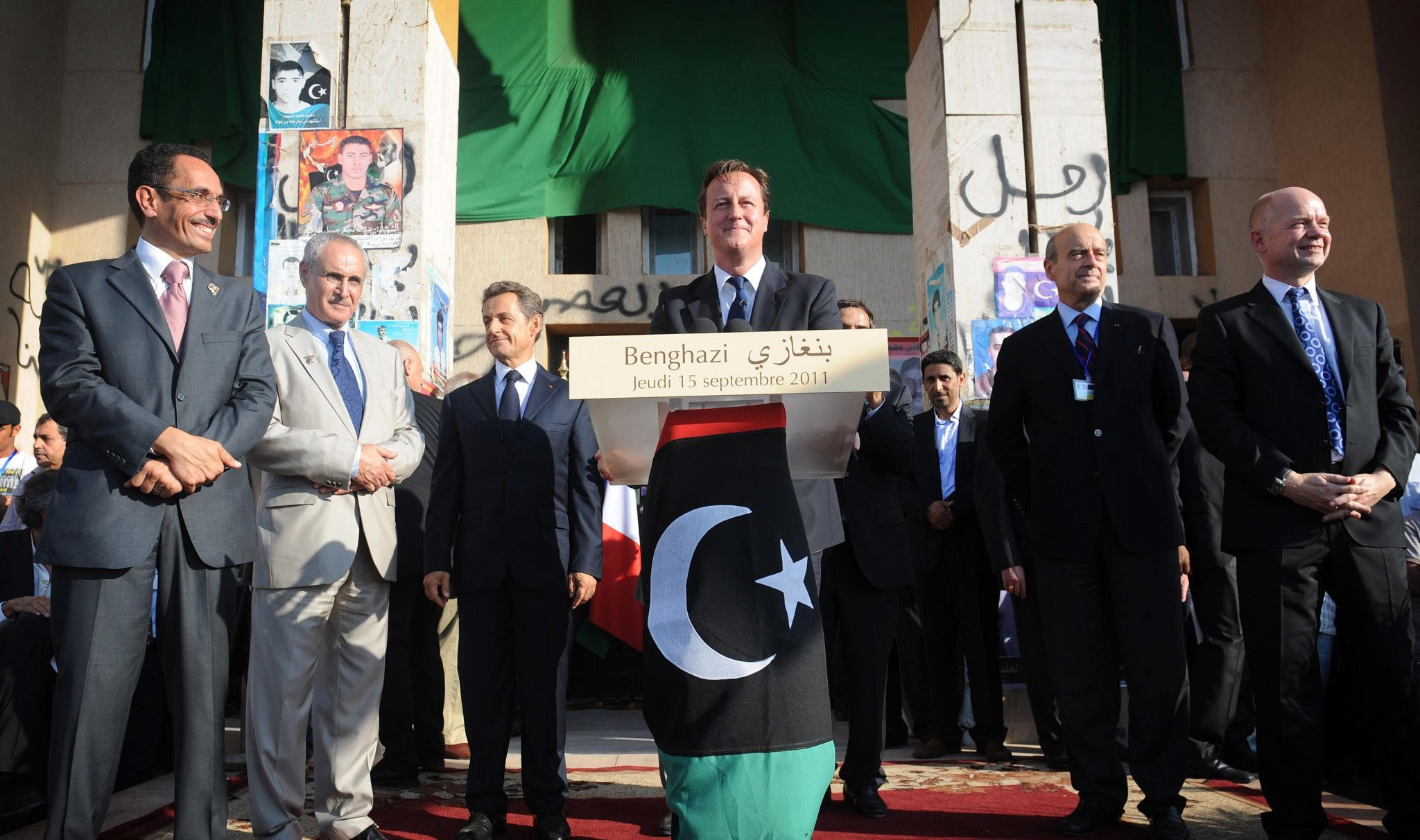- Manchester bomber Salman Abedi, Reading knifeman Khairi Saadallah and London Bridge terrorist Rachid Redouane all fought with Islamist groups in the UK’s 2011 war in Libya
- Another veteran was Tunisian terrorist Seifeddine Rezgui who mowed down 30 Britons on a beach six years ago next month
- Qatar provided arms and money to the Libyan rebels in 2011 with the blessing of David Cameron’s government
- Britain likely had covert contacts with the Islamist forces and may even have been involved in training them
While David Cameron faces awkward questions about his role in political lobbying, he is escaping accountability for a far worse offence — Britain’s secret alliance with radical Islamist elements in the Libyan war of 2011.
Many militants who fought in the Nato-backed war that overthrew Libyan leader Muammar Gaddafi went on to become involved in terrorism, with four slaughtering Britons in separate attacks at a park, a music concert, a market and a beach.
Their collective victims number 63.
A year ago next month, Khairi Saadallah stabbed six people socialising in a park in Reading, southern England. His attack, which took place in under a minute, killed three people.
In his subsequent trial, the court heard that Saadallah, a 26-year-old Libyan who came to the UK in 2012, had fought for eight months in the 2011 war in his country.
Another veteran was Salman Abedi, the Manchester bomber who detonated a homemade, shrapnel-laden explosive four years ago this week, killing 22 innocent people attending an Ariane Grande pop concert.
Two other terrorists who later killed Britons also fought in the UK’s war in Libya. Rachid Redouane, a Moroccan, was one of three men who carried out the terrorist attack on London Bridge and neighbouring Borough market four years ago next month.
The men drove a van into pedestrians and proceeded to stab bystanders before police arrived and shot dead all three assailants. Eight people were killed and 48 injured.
Six years earlier, Redouane had travelled to Libya, his father’s country of birth, to fight in the war against Gaddafi’s forces.
It is not known if Redouane had any contacts with another future terrorist who was also in Libya at the time: Seifeddine Rezgui. A Tunisian, Rezgui is reported to have joined the war against Gaddafi by accompanying men who were smuggling arms to the rebels, and may have taken part in military action.
Four years later, in June 2015, Rezgui mowed down 38 tourists with a machine gun at a beach hotel in the Tunisian resort of Port El Kantaoui, in the name of the Islamic State terrorist group.
Thirty British tourists were among the dead in the worst attack on Britons since the July 2005 London bombings. It was Tunisia’s deadliest attack ever.
The terrorism perpetrated by these four militants raises further questions about the UK’s role in the Libyan war and its links to the radical Islamist forces for whom the likes of Abedi, Saadallah, Redouane and Rezgui were fighting.
The UK’s key ally
Britain’s Royal Air Force conducted numerous air attacks on Gaddafi’s forces in 2011, alongside French warplanes, which likely killed hundreds of civilians according to a recent study by the investigative group Airwars.
But it is the UK’s covert role in the war, and its support of Qatar, that are just as controversial.
The oil and gas-rich Gulf state of Qatar poured massive quantities of arms and money into the hands of the militant groups fighting Gaddafi. It was part of the regime’s broader foreign policy which seeks to actively support Islamist groups across the Middle East — some of which want to stand in democratic elections, while others have more sinister ambitions.
To this end, the Qatari regime is believed to have supplied at least 20,000 tons of weapons to Libyan rebel forces in 2011, including machine guns, automatic rifles, ammunition and anti-tank guns.
Qatar also sent hundreds of its own troops to support the Libyan rebels and is reported to have funded them to the tune of $400-million.
This support was given with the blessing of David Cameron’s UK, which was opposed to Norwegian attempts to broker a peaceful outcome. The Times reported in August 2011, six months after the uprising against Gaddafi had begun, that Britain and France were “using Qatar to bankroll the Libyan rebels”.
The reason was that Nato airstrikes, which began in March 2011, had so far failed to dislodge Gaddafi while the rebels “lack the firepower and military discipline to take advantage on the ground”.
The Obama administration in the US secretly approved Qatar’s arms shipments to Libya in spring 2011 and, according to the New York Times, “within weeks… began receiving reports that they were going to Islamic militant groups”.
But this did not make Britain, the US and France reconsider their support for Qatar’s arms shipments.
Qatar’s chief-of-staff, Major-General Hamad bin Ali al-Atiya, said at the time that the Gulf state “supervised the rebels’ plans”, adding: “We acted as the link between the rebels and Nato forces.”
Indeed, Qatar stated the following year that its actions in arming the opposition forces “were in full coordination with Nato and under its umbrella”.
The Gulf regime backed various opposition groups in Libya and the sheer quantity of arms and finance, alongside the fluidity between the rebel forces, makes it likely they all benefited, directly or indirectly.
The Libyan Islamic Fighting Group
One militia that received Qatari support was the Libyan Islamic Fighting Group (LIFG), an armed force created in 1995 to establish an Islamic state in Libya. This is significant in that Manchester bomber Salman Abedi is reported to have joined and fought with the LIFG in the 2011 war.
He had been brought to the conflict by his father, Ramadan, who is known to have been a prominent member of the LIFG since its founding.
The LIFG was the group that Britain’s external intelligence agency, MI6, covertly financed to assassinate Gadaffi in 1996, in a plot that failed. When Gadaffi’s regime clamped down on the militia following the assassination attempt, the UK gave refuge to some of its members and dozens were allowed to settle in Britain.
An extraordinary admission was made by the British government in March 2018, when it told parliament it “likely” had contacts with the LIFG in Libya during the 2011 war. It added that it was “in communication with a wide range of Libyans involved in the conflict”.
This admission has never been reported in the British press.
It is possible that British covert forces operating in Libya were supporting the LIFG. Within a month of the uprising beginning, in March 2011, the then foreign secretary William Hague admitted to parliament that UK special forces were in Libya, after a joint SAS-MI6 team was captured by suspicious farmers.
Then in August 2011, press reports noted that Britain’s SAS and French special forces were on the ground in the eastern part of the country, “calling in air strikes and helping rebel units” to assault cities still in the hands of pro-Gaddafi forces.
The Guardian noted that the British soldiers were taking “a leading role not only in guiding bombers to blast a path for opposition fighters but also in planning the offensive that finally broke the six-month siege of Misrata”, a coastal city in northwest Libya.
But the UK did not just secretly back the Islamist forces in Libya. The British government appears to have facilitated them reaching the conflict zone in the first place.
Middle East Eye has revealed the British government operated an “open door” policy — with the support of the domestic security agency, MI5 — which allowed Libyan exiles in Britain and British-Libyan citizens to join the uprising.
Several former rebel fighters said they had been able to travel to Libya with “no questions asked”. These dissidents were members of the LIFG and most were from Manchester, Abedi’s home town which was also the centre for Libyan Islamists in the UK.
Journalist Peter Oborne has written that Libyan dissidents were “undoubtedly encouraged” to travel to Libya to oust Gaddafi and that this was with the “encouragement of MI6”. The British authorities were even said to have released terror suspects from the control orders on them that were in place at the time, to facilitate them getting to Libya.
Training terrorists?
It is possible that some of the future terrorists were given military training in Libya at this time, another question the Manchester bombing inquiry should put to David Cameron, special forces commanders and intelligence chiefs.
Britain is known to have trained rebel groups in advance of the attack on Tripoli and, along with Qatari and French forces, is also reported to have secretly trained opposition fighters in the Nafusa mountains in northwest Libya, 210 kilometres from Tripoli.
It was there, in the town of Nalut, at the western end of the mountains, that the Tripoli-based Liwa al Ummah unit is said to have received training from Qatari special forces. London Bridge attacker Redouane fought in this unit in Libya.
The militia was founded by Mahdi Al-Harati, an Irish-Libyan who led the Tripoli Brigade during the battle of Tripoli in 2011.
Qatar’s training of the militia groups is reported to have involved “about 30 Western liaison officers, including Britons, French and several Americans”. Reading attacker Saadallah claims to have been trained by French soldiers in Libya.
France is also known to have dropped consignments of machine guns, rocket-propelled grenades and anti-tank missiles to the rebels in the Nafusa mountains.
The UK government has denied playing any role in Qatar’s training of armed opposition groups in Libya.
The militant force for whom Saadallah fought in Libya was Ansar al-Sharia, which had formed at the beginning of the uprising against Gaddafi. The following year, it was involved in the attack on the US consulate in Benghazi, Libya’s main eastern city, which resulted in the death of US ambassador Christopher Stevens.
Two other British Islamists who fought in Libya — again reportedly with the Tripoli Brigade — were the Abdallah brothers, Mohammed and Abdalraouf, also of Manchester.
Mohammed Abdallah was in 2017 found guilty by a British court of possessing an AK47 rifle, receiving money for terrorism and of membership of Islamic State. He was jailed for 10 years.
He was assisted by his brother Abdalraouf who had been paralysed from the waist down after being shot while taking part in the 2011 Libyan war. Five years later, back in the UK, Abdalraouf was found guilty of assisting others in committing acts of terrorism and terror funding and jailed for five and a half years.
Abdalraouf Abdallah was in touch with Manchester bomber Salman Abedi in the months leading up to the attack in May 2017 and is considered to have been a radicalising influence on him.


